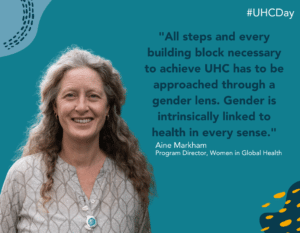Q&A with Ms. Aine Markham on gender equity and Universal Health Coverage
8 December 2022

We spoke to Ms. Aine Markham, Program Director of the Gender Transformative Leadership Program for Women in Global Health. Aine has worked for over 25 years in several countries in Africa, Asia and Latin America in medical humanitarian assistance and global health. Here she talks about the gender component of Universal Health Coverage (UHC), and the barriers facing women that must be addressed if countries are to make progress on achieving UHC.
We know that there’s a very strong gender component to Universal Health Coverage that sometimes gets overlooked. How can we address gender equity towards the achievement of UHC in your view?
All steps and every building block necessary to achieve UHC has to be approached through a gender lens. Gender is intrinsically linked to health in every sense. The best and most obvious example of this is the health workforce, 70% of which are women. Some 90% of all health workers that provide direct care to patients are women, but less than 30% of women are in health leadership. Realistically, Universal Health Coverage cannot be achieved without women and girls having a seat at the table and actively using their voice in decision-making on issues pertaining to health policies and practices.
You’ve worked in several contexts over the past 25 years. What, in your view, do you see as the biggest barriers for women when we think about making progress on Universal Health Coverage?
Women not only make up the majority of health workers, they are also the main care providers in families and in communities across the globe. A common and significant barrier for women is the lack of self autonomy, the ability of women to make decisions about their own bodies. The most obvious example is access to safe abortion and contraception.
Then in the health workforce we see that health workers are frequently exposed to harassment and violence. WGH is working to bring attention to the threat that women health workers face from sexual harassment and violence on a daily basis. We’re releasing a report next week on our #HealthToo platform and research project. Women need legal frameworks that protect them both at home and at work, and assures their right to make decisions about and for themselves.
You’re a strong proponent of the need for a people centered approach to healthcare to achieve UHC. So can you talk about why that’s important in terms of gender equity and health?
I think often people don’t realize when we use the term “people-centered” healthcare, we use it to refer not only to the patient, but also their families, the health workers that care for them, and in many cases, the community that they live in, so everyone that is involved with the patient’s care. As we already know, women make up the majority of carers worldwide. Using a people-centered approach without taking gender into consideration isn’t possible, so it has to be done. Health care is fundamentally gendered. So, by using a gendered approach, a gender lens, we can ensure better health outcomes for everyone.
What steps do you think countries in general can take to advance gender equity towards the achievement of UHC?
Two main things come to mind. Obviously there are many others, but the two I’d mention here would be, one: to put women at all levels where decisions get made, as it has already been shown that this results in better policies, improved health outcomes, is more inclusive of vulnerable population groups and reduces discrimination. It’s more inclusive of areas that tend to be forgotten. Women are not part of these decision making bodies and it also reduced discrimination. So definitely putting women at all levels of decision making, can help and would be one thing I’d recommend. And two: driving policies and legal frameworks that create gender equity. It won’t happen by itself. It needs frameworks within a region and it can happen.